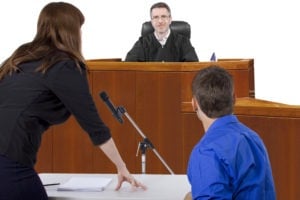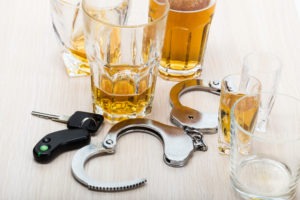
An administrative license revocation (ALR) hearing is your one opportunity to avoid a license suspension after you were charged with a DWI. While an ALR hearing may look similar to a criminal court case, it will not replace any criminal court proceedings that stem from being arrested for a DWI.
At an ALR hearing, your Houston DWI lawyer will fight on your behalf to prove that the circumstances surrounding your DWI were not handled properly by the police. Due to the directness of the questioning, and the people involved, ALR hearings are often gold mines for discovery and testimony regarding your criminal case.
What Is the Purpose of an ALR Hearing?
The purpose of an ALR hearing is to let your attorney challenge the evidence in your case. It presents you with the opportunity to avoid a license suspension and keep your driving privileges. It also provides the opportunity for you and your attorney to get testimony to show the mistakes that were made during your DWI arrest. To prove this, your attorney will question the methods used by the police officer when they requested that you take your sobriety test.
These hearings take place when you have your license suspended because you:
- Refused to take a blood or breath test
- Blew a BAC of .08 or higher
According to Texas Transportation Code §724.015, drivers in Houston and around the state may choose to refuse a breath or blood test if they were pulled over by a police officer, even if that officer has reasonable suspicion they were driving while intoxicated.
Though drivers have the right to forgo a blood or breath test, a refusal to submit to this test will result in a suspension of that person’s driver’s license. This is the same punishment as if someone failed the blood or breath test.
Your suspension period will last at least 180 days but may be as long as two years.
For a legal consultation, call (713) 225-1900
How do ALR Hearings Function?
An ALR hearing will involve an examination of the witnesses and facts in your case. While this process may seem straightforward, you want our team on your side during the proceedings.
Our team has handled countless ALR hearings, and we have the knowledge and experience to back you. In fact, our founder is a certified Standardized Field Sobriety Test instructor and practitioner. He knows how to examine your arrest and any tests performed. Better yet, he knows how to poke holes in the case against you.
During the hearing, we can question several things, including:
- Whether or not the officer had sufficient probable cause for the initial stop
- Questioning of the police officer who administered the standardized field sobriety tests
- Ensuring the officer provided the appropriate warnings prior to requesting you submit a sample of your breath or blood
These are just a few of Texas ALR hearing questions we’ll get answers to during the hearing process. Your attorney will be sure to include anything else that they feel will benefit your case.
The Administrative Law Judge (ALJ) overseeing the hearing will consider the evidence and issue a ruling. If the ALJ rules that the department did not prove its case against you, your license will not be suspended.
How Long do You Have to Request a Hearing?
You have only 15 days (or 20 days from receiving a Notice of Suspension if you consented to a blood test) to request an ALR hearing. This is a very short period of time, so it is vital that you ensure you seek proper legal representation immediately following your DWI arrest.
If you refuse to take a breath or blood test, an officer will give you a temporary license and a Notice of Suspension for your license. This temporary license remains in effect for 40 days. The time frame to request a hearing is 15 days; once a hearing is requested, this temporary license remains valid until the ALR hearing takes place.
The Texas Department of Public Safety (DPS) provides an online form for parties to request ALR hearings. The form requires important information about the driver, including their:
- Driver’s license number
- Full name
- Date of birth
- Mailing address
- Phone number
You will also be asked to provide the date of your arrest, the arresting officer’s name, the officer’s agency, whether you refused to take the test, and if you did take the test, whether or not you failed it.
A Houston attorney can work with you to ensure that your request for a hearing is filed within the time limit. Additionally, they will make sure that your information is filed accurately, by gathering necessary documentation. If your request is made incorrectly or if the deadline for your request passes, there is nothing you can do to fix the mistake.
Click to contact our Houston lawyer today
What If the ALR Hearing does Not Go in My Favor?
According to State Office of Administrative Hearings (SOAH) guidelines, you do not have to accept losing your license without a fight.
To file an appeal, you or your attorney must file an appeal within 30 days of your initial hearing. Each court will have its rules and guidelines, so the best way to understand the appeals process is to let your lawyer explain it.
You must send a certified copy of your appeal to the DPS office in Austin by certified mail. Some courts may also require a certified record of your initial hearing. The judge who hears your appeal will make a final determination.
Complete a Case Evaluation form now
What Are the Consequences of Losing My Texas Driver’s License?
Whether long- or short-term, losing your license can wreak havoc in your personal and professional lives. In addition to preventing you from driving yourself or your family on necessary trips, the consequences of a suspended license can include the following:
- You could be left without a valid form of identification, which can make everyday life challenging.
- If you are a commercial driver, your current and future employment could be negatively affected.
- You cannot purchase or register a car in Texas.
- Your insurance rates could go up in the future.
- Transportation costs for you and your family could skyrocket.
- You may need to obtain a Texas state identification card.
- You will likely inconvenience your family and other people around you if you cannot drive yourself to work, drive your kids to school, or run errands.
You could face hefty fines and potential jail time if caught driving without a license. A Houston criminal defense lawyer from our firm can help you avoid these consequences and fight to hold on to your license.
How Long Will the Suspension Remain on My License?
The length of your suspension will vary based on whether you submitted to a BAC test or refused. If you refused:
- First-time offenders can lose their license for 180 days
- Subsequent offenders can lose their license for two years
If you submit to testing and your BAC is measured at .08% or higher:
- First-time offenders can lose their license for 90 days
- Subsequent offenders can lose their license for one year
A DWI lawyer from our firm will represent you and build a strong case at your hearing. They can question the arresting law enforcement officers and present evidence to keep your license.
Reach Out to an ALR Hearing Attorney at Blass Law to Get Started
If you have been arrested for a DWI, do not waste any time contacting Blass Law. We can help you to better understand the concept of an ALR hearing and how it can protect your right to drive after a DWI arrest. We can also take the lead in requesting these hearings and representing your interests before the court.
To get answers to your Texas ALR hearing questions and learn more about how you can give yourself the best chance for the best possible outcome, call us today.
Call or text (713) 225-1900 or complete a Case Evaluation form


